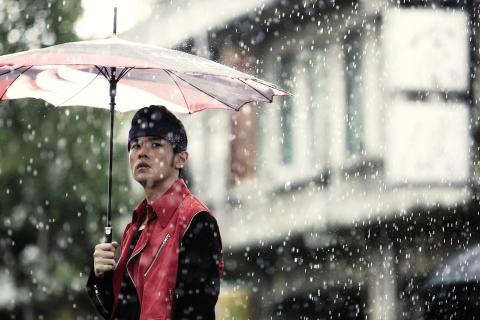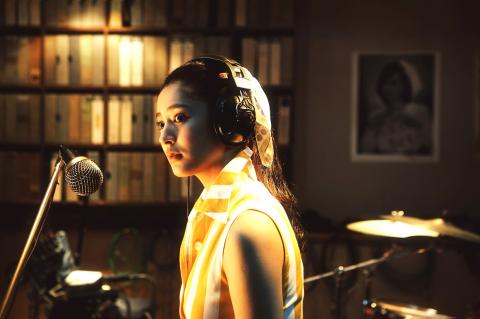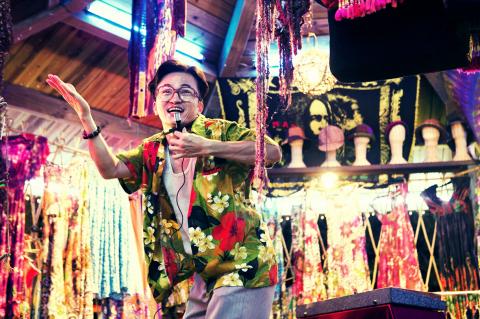Six years after his directorial debut Secret (不能說的祕密), Mando-pop star Jay Chou (周杰倫) returns with The Rooftop (天台), a hyper-ostentatious musical in which he realizes the dream of every straight boy by becoming a kung-fu hero and winning the lady’s heart.
But unlike the well-crafted Secret, a simple but satisfying puppy-love story, Chou’s ambitious second feature has gone too far in its pursuit of technical excellence and loses sight of its purpose of telling a relatable story.
Set in the fictional city of Galilee, the movie centers on Wax (Chou) and his buddies, a carefree bunch who while their youthful days away riding around town, getting into trouble and helping out at Dr. Bo’s (Hong Kong veteran Eric Tsang, 曾志偉) Chinese medicine pharmacy, where they learn kung-fu from the jolly old Bo.

Photo courtesy of Chuang Ying Picture
By night, the friends return home to the titular Rooftop, a ramshackle settlement built on top of an old building in the seedy part of town. Though penniless, the rooftop’s dwellers are a cheerful gang, ready to burst into song and dance at any time and take care of each other like a big family.
Wax’s blithe life changes when he meets his dream girl Starling — played by newcomer Li Xinai (李心艾) from China — who has been forced into the entertainment business by her gambling father (Hong Kong’s Chung Chun-to, 鍾鎮濤).
Wax soon wins the belle’s heart, but their innocent love doesn’t last long. Facing the rich and corrupt movie star William (Taiwanese singer Darren, 邱凱偉), who salivates over Starling’s beauty, and a band of much more sinister mobsters, the hero must prove his mettle and save the girl from falling into the hands of the wicked.

Photo courtesy of Chuang Ying Picture
Credited as director, scriptwriter, actor and songwriter, Chou successfully creates a visually opulent fairy tale bursting with retro sensibilities, with a little help from his top-notch international production crew including cinematographer Mark Lee (李屏賓).
Vintage cars, disco colors and hippie-inspired fashion fill every frame, while the meticulous work of multi-award winning costume designer Wu Li-lu (吳里璐) renders the movie a male version of Sex and the City.
The same amount of effort is invested in crafting the movie’s atmosphere. From the bright neon lights at Bo’s pharmacy, to the romantic backdrop on the rooftop that recalls Baz Luhrmann’s Moulin Rouge!, the ornate sets by the internationally acclaimed art director Akatsuka Yoshihito from Japan — whose works include Kill Bill I and Seediq Bale (賽德克巴萊) — firmly root the movie in a fantastic realm with all traces of reality removed.

Photo courtesy of Chuang Ying Picture
A spectacular example is the night market scene at which the love between Wax and Starling buds. Built from scratch in a scenic area in Greater Tainan, the bustling night market looks like a glittery mirage floating on a lake, accessible only by swan-shaped paddleboats.
To Chou’s credit, the movie is not short on audiovisual wonders, which are part of any musical’s allure. The musical numbers are masterfully choreographed and occasionally show off Chou’s well-trained biceps. Sometimes, stunning visual effects are not created with a computer, but by ingenious camera work and clever art design.
The technical perfection, however, cannot make up for the absence of genuine emotions and feelings necessary for keeping viewers engaged and moving along with the melodramatic flow. The Rooftop is essentially all about Jay Chou, the Mando-pop king. His part doesn’t demand much acting: Chou plays himself and spends considerable screen time wooing the girl, who doesn’t do much except smile sweetly, and hanging out with his real-life buddies such as Devon Song (彈頭). The rest of the movie is Chou’s fantasy come true: He is the martial-arts hero who beats up bad guys and saves the beauty. Unfortunately, neither the star nor his fantasy is particularly interesting.
With hackneyed plots and wooden performances by the two leads, Chou’s The Rooftop remains a glossy confection, impressive at first sight but quickly forgotten.

In the March 9 edition of the Taipei Times a piece by Ninon Godefroy ran with the headine “The quiet, gentle rhythm of Taiwan.” It started with the line “Taiwan is a small, humble place. There is no Eiffel Tower, no pyramids — no singular attraction that draws the world’s attention.” I laughed out loud at that. This was out of no disrespect for the author or the piece, which made some interesting analogies and good points about how both Din Tai Fung’s and Taiwan Semiconductor Manufacturing Co’s (TSMC, 台積電) meticulous attention to detail and quality are not quite up to

April 21 to April 27 Hsieh Er’s (謝娥) political fortunes were rising fast after she got out of jail and joined the Chinese Nationalist Party (KMT) in December 1945. Not only did she hold key positions in various committees, she was elected the only woman on the Taipei City Council and headed to Nanjing in 1946 as the sole Taiwanese female representative to the National Constituent Assembly. With the support of first lady Soong May-ling (宋美齡), she started the Taipei Women’s Association and Taiwan Provincial Women’s Association, where she

Chinese Nationalist Party (KMT) Chairman Eric Chu (朱立倫) hatched a bold plan to charge forward and seize the initiative when he held a protest in front of the Taipei City Prosecutors’ Office. Though risky, because illegal, its success would help tackle at least six problems facing both himself and the KMT. What he did not see coming was Taipei Mayor Chiang Wan-an (將萬安) tripping him up out of the gate. In spite of Chu being the most consequential and successful KMT chairman since the early 2010s — arguably saving the party from financial ruin and restoring its electoral viability —

It is one of the more remarkable facts of Taiwan history that it was never occupied or claimed by any of the numerous kingdoms of southern China — Han or otherwise — that lay just across the water from it. None of their brilliant ministers ever discovered that Taiwan was a “core interest” of the state whose annexation was “inevitable.” As Paul Kua notes in an excellent monograph laying out how the Portuguese gave Taiwan the name “Formosa,” the first Europeans to express an interest in occupying Taiwan were the Spanish. Tonio Andrade in his seminal work, How Taiwan Became Chinese,